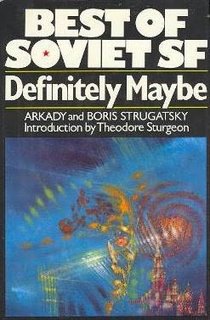The homeostatic universe
Have you ever felt like you are on the brink of the breakthrough you'd been expecting a long time, just about to get the right idea that will solve the problem you've been working on for months, and then you get suddenly interrupted by someone or something that comes in your way just at that precise time? Have you ever gotten this strange feeling that this keeps happening to you? That every time you finally set down to work and start to get that feeling of near accomplishment something happens that demands your attention elsewhere? Is it a sudden phone call, a persistent bureaucratic nuisance, a relative dropping by for an undesired visit, appliances breaking down just at the worst possible time when you were finally trying to think quietly about your work? Then you may be a victim of the homeostatic universe.

In that case, you should definitely read the novel "A billion years to the end of the world" by the Strugatsky brothers (which for some strange reason appeared in English translation with the title "Definitely Maybe"). The novel would be perfect for an adaptation for drama theater, as the action happens almost entirely within the living room of one of the characters (which is quite unusual for a science fiction novel), with a rare excursus into one of the neighbors' apartments within the same highrise building in the center of Moscow. The main character, astrophysicist Malianov, is happily working away at his M-cavities equations, when all sort of strange events start to happen with the effect of driving him away from his work, with increasing force, any time he starts to feel he is about to get somewhere with his calculations.
The other characters begin to appear, in turn visting his apartment, some of them mysterious apparitions between reality and the unlikely, others scientists like him with similar complaints. I most definitely do not want to spoil your fun reading it so I will try not to reveal too much of the story, but the homeostatic universe mentioned above comes to play a fundamental role in explaining the strange phenomena that the characters of the novel in turn experience.
The book is one of the nicest science fiction stories I've read. Moreover, if you happen to hang around certain circles (as I admit I do) you will not fail to notice pretty soon in the novel that the setting and the characters look strangely familiar. I think I am not revealing any deep secret if I mention, for instance, that the mathematician Vecherovsky, who is one of the main characters in the story, is quite visibly the real life mathematician Yuri Ivanovich Manin.
Even if you fail to notice the real life innuendos, you will still enjoy greatly the reading, as long as you are minimally familiar with the scientist's work and have experienced the frustration of being continuously interrupted (harassed by the real world - or by the self defence mechanism of the homeostatic universe perhaps).

In that case, you should definitely read the novel "A billion years to the end of the world" by the Strugatsky brothers (which for some strange reason appeared in English translation with the title "Definitely Maybe"). The novel would be perfect for an adaptation for drama theater, as the action happens almost entirely within the living room of one of the characters (which is quite unusual for a science fiction novel), with a rare excursus into one of the neighbors' apartments within the same highrise building in the center of Moscow. The main character, astrophysicist Malianov, is happily working away at his M-cavities equations, when all sort of strange events start to happen with the effect of driving him away from his work, with increasing force, any time he starts to feel he is about to get somewhere with his calculations.
The other characters begin to appear, in turn visting his apartment, some of them mysterious apparitions between reality and the unlikely, others scientists like him with similar complaints. I most definitely do not want to spoil your fun reading it so I will try not to reveal too much of the story, but the homeostatic universe mentioned above comes to play a fundamental role in explaining the strange phenomena that the characters of the novel in turn experience.
The book is one of the nicest science fiction stories I've read. Moreover, if you happen to hang around certain circles (as I admit I do) you will not fail to notice pretty soon in the novel that the setting and the characters look strangely familiar. I think I am not revealing any deep secret if I mention, for instance, that the mathematician Vecherovsky, who is one of the main characters in the story, is quite visibly the real life mathematician Yuri Ivanovich Manin.
Even if you fail to notice the real life innuendos, you will still enjoy greatly the reading, as long as you are minimally familiar with the scientist's work and have experienced the frustration of being continuously interrupted (harassed by the real world - or by the self defence mechanism of the homeostatic universe perhaps).

